Long Island’s Most Common Stinging Insects
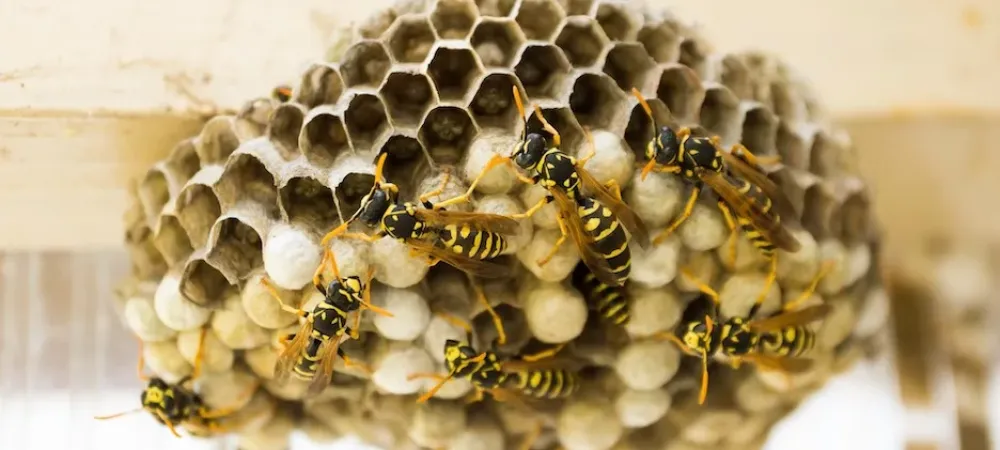
Stinging insects are some of the most dangerous and frustrating pests to deal with here in the Long Island area. Although there are a lot of perks to living in Southeast New York, the unwelcome presence of wasps, hornets, and bees can make simple things like enjoying your own home, backyard, or outdoor event difficult. In addition to the painful stings and thousands of dollars of damage, these pests can do to your home’s structure, stinging insects can also lead to serious allergic reactions that could be life-threatening for you, your family, and your pets.
Identifying Familiar Stinging Pests of Long Island
You’ve probably seen quite a few different types of stinging insects around Long Island. Some of the most common types of these pests you will encounter here are:
- Paper wasps
- Carpenter bees
- Bald-faced hornets
- Yellowjackets
- Honey bees
Paper Wasps
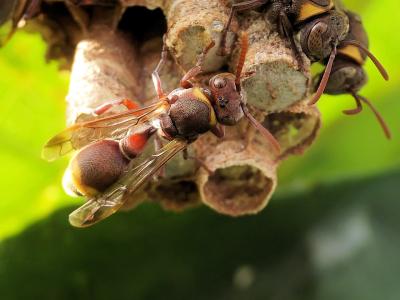
Brown or black in color, but most easily recognizable by the open-faced honeycomb pattern nests they construct. Paper wasps are a common sight in Long Island, where they can be found in a variety of habitats, including gardens, fields, and forests. These insects are named after the paper-like material they use to construct their nests, which are often found hanging from trees or attached to buildings.
Carpenter Bees
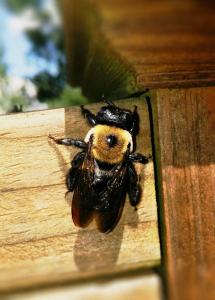
Possibly the most destructive stinging insects, carpenter bees like to burrow directly into wood structures on or around your home, like pergolas, windowsills, and decks. They are often mistaken for bumblebees due to their similar appearance, but carpenter bees have a shiny black abdomen, while bumblebees have a fuzzy yellow and black abdomen.
Bald-Faced Hornets
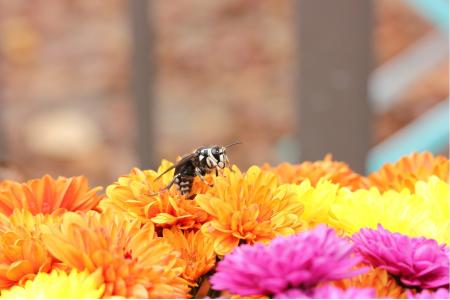
Named for their stark white face and dark black body, these hornets like to construct large, soccer-ball shaped nests in trees, bushes, and next to buildings. These nests can contain several hundred hornets, and the insects can become aggressive if they feel threatened. While bald-faced hornets can be a nuisance to homeowners, they play an important role in the ecosystem by controlling populations of other insects and pollinating plants. It is important to exercise caution around bald-faced hornet nests and to contact a professional if you need to have one removed from your property.
Yellow Jackets
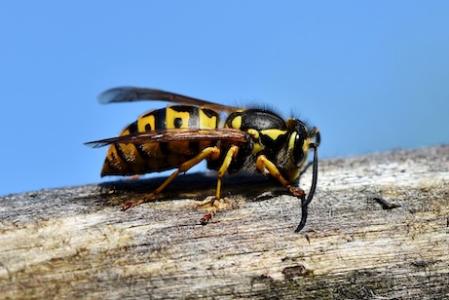
Quickly identified by their characteristic yellow and black hind quarters, yellow jackets build nests in a variety of locations, including in the ground, in tree stumps, and in walls or ceilings of buildings. They are attracted to sweet foods and drinks, which can make them a nuisance at outdoor events. Yellow jackets can sting multiple times, and their venom can be dangerous to individuals who are allergic to insect venom. It is important to exercise caution around yellow jackets as they can sting in frenzies.
Honey Bees
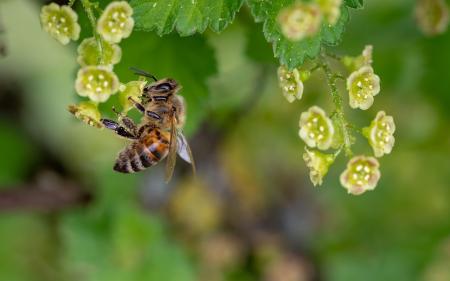
Fuzzy, yellow and black-striped bees who build large nests in old trees, houses, and other structures to increase their population and create honey. Honey bees play an important role in the ecosystem by pollinating flowers and plants, and their honey is a valuable food source for humans. Honey bees build hives in a variety of locations, including in trees and on buildings, and they can be found in gardens, fields, and forests. While honey bees are generally not aggressive, they can sting if they feel threatened. It is important to exercise caution around honey bees and to contact a professional if you need to have a hive removed from your property.
The Best Solution: Eco-Friendly Wasp And Bee Control From A&C Pest Management
Although they can be effective, using harsh chemicals to deal with insects like wasps, bees, and hornets is not always the best approach. These methods can not only be harmful to the surrounding environment, but they can also potentially cause health problems for you and your loved ones. That’s why A&C Pest Management uses eco-friendly products in our pest management strategies. When you partner with us for stinging insect control, you can get back to enjoying your home and backyard without worrying about the negative consequences of stinging insects or the products used to get rid of them.
Every stinging insect infestation presents a unique challenge and requires a skilled hand to safely and effectively take care of the problem. Wasp extermination, bee removal, and hornet control aren’t simply a matter of spraying the nest and individual insects. Trying to deal with wasps or bee nests on your own can be dangerous, so it's best to leave it to the experienced professionals from A&C Pest Management. Our methods for reliable wasp, bee, and hornet control make use of the most up-to-date technology and pest management strategies, including:
- Treatments tailored to the specific pest present and their nesting habits, colony size, and unique characteristics.
- Using micro-injections of insecticides and specialized aerosols to target and eliminate nests.
- Residual dust formulations to deal with any stragglers that may return after initial treatment.
- Removing nests or sealing up nest holes around your home to help prevent future infestations from occurring.
Trust A&C Pest Management With All Your Stinging Insect Problems
Some of the best parts of A&C Pest Management’s pest control offerings? We offer same-day services and a strong service guarantee for all our pest control options, so if pests are still present after your scheduled treatments, we will re-treat your home at no extra cost to you. Additionally, this month you can get $50 off your initial service when you sign up for our annual Peace of Mind Program.
Whatever type of stinging insect you’re dealing with, Long Island’s premier pest control professionals from A&C Pest Management are here to help. With our eco-friendly wasp and bee control and a wide variety of service packages, you can rest easy knowing that your home and loved ones will be protected from these menacing pests without causing damage to the surrounding environment.

